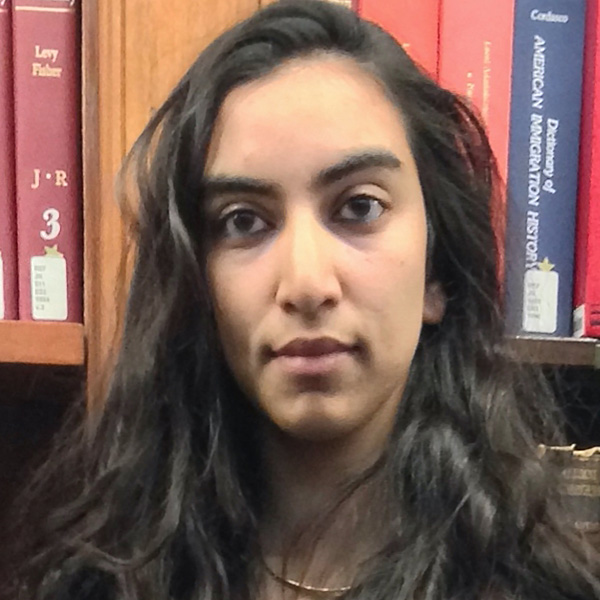Faculty Research Fellow
 Urvashi Chakravarty (Ph.D. University of Pennsylvania, 2010) works on early modern English literature, critical race studies, queer studies, and slavery and servitude in early modern England and the Atlantic world. Her first book, Fictions of Consent: Slavery, Servitude, and Free Service in Early Modern England, explores the ideologies of Atlantic slavery in early modern England, revealing the everyday sites where the foundations of racialized slavery were laid. Fictions of Consent will be published by the University of Pennsylvania Press in March 2022 as the first book in a new series on “RaceB4Race: Critical Race Studies of the Premodern.” Her second book, currently in progress, is titled From Fairest Creatures: Race, Reproduction, and Slavery in the Early Modern British Atlantic World, and explores the nexus of race and reproduction, including the construction of white womanhood and white childhood in the early modern Atlantic world, and its relationship to the structures of colonial violence and enslavement. She has written articles on, among other subjects, early modern race and reproduction; queer and racialized futurity; labour, domestic service, and whiteness; the “spiriting” of indentured labourers; and the future of early modern race studies. These essays appear or are forthcoming in English Literary Renaissance, Shakespeare Quarterly, The Journal of Early Modern Cultural Studies, Spenser Studies, postmedieval, Literature Compass, and the edited collections Queering Childhood in Early Modern English Drama and Culture, Shakespeare/Sex: Contemporary Readings in Gender and Sexuality, and The Cambridge Companion to Shakespeare and Race.
Urvashi Chakravarty (Ph.D. University of Pennsylvania, 2010) works on early modern English literature, critical race studies, queer studies, and slavery and servitude in early modern England and the Atlantic world. Her first book, Fictions of Consent: Slavery, Servitude, and Free Service in Early Modern England, explores the ideologies of Atlantic slavery in early modern England, revealing the everyday sites where the foundations of racialized slavery were laid. Fictions of Consent will be published by the University of Pennsylvania Press in March 2022 as the first book in a new series on “RaceB4Race: Critical Race Studies of the Premodern.” Her second book, currently in progress, is titled From Fairest Creatures: Race, Reproduction, and Slavery in the Early Modern British Atlantic World, and explores the nexus of race and reproduction, including the construction of white womanhood and white childhood in the early modern Atlantic world, and its relationship to the structures of colonial violence and enslavement. She has written articles on, among other subjects, early modern race and reproduction; queer and racialized futurity; labour, domestic service, and whiteness; the “spiriting” of indentured labourers; and the future of early modern race studies. These essays appear or are forthcoming in English Literary Renaissance, Shakespeare Quarterly, The Journal of Early Modern Cultural Studies, Spenser Studies, postmedieval, Literature Compass, and the edited collections Queering Childhood in Early Modern English Drama and Culture, Shakespeare/Sex: Contemporary Readings in Gender and Sexuality, and The Cambridge Companion to Shakespeare and Race.
Fellowship Research Project—From Fairest Creatures: Race, Reproduction and Slavery in the Early Modern British Atlantic World
This fellowship will support the completion of my second book project, which explores the nexus of race and reproduction in the early modern Atlantic world. From Fairest Creatures attends to the ways in which English formations of family and kinship were intimately connected to—indeed, reliant on—the intellectual, conceptual, political, and economic architectures of race and slavery in the British Atlantic world. The word “family” is itself etymologically tied to slavery through its linguistic roots in the word famulus, a Roman household slave, philologically braiding together reproductive and enslaved labour; this book therefore seeks to recover and reconceptualize the discursive and cultural mechanisms by which the generation of an enslaved and labouring population reframed ideas of lineal, familial, and racial futurity in English contexts. In other words, this project rethinks our ideas of the relationship between the family, the nation, and the empire through a sustained interrogation of the discursive and political nexus of race and reproduction. At the same time, it aims to work across chronological and geographical disciplinary divides to reimagine the relationship between England and its Atlantic trades, traffics, and territories. Central to this relationship, I argue, was the formation of white womanhood and white childhood in early modern England and the Atlantic world. From Fairest Creatures reveals how early modern texts construct a representation of womanhood and childhood specifically and explicitly marked (and unmarked) as white and argues that this construction of white womanhood and childhood was in turn mobilized to underwrite the operations of violence and enslavement.


